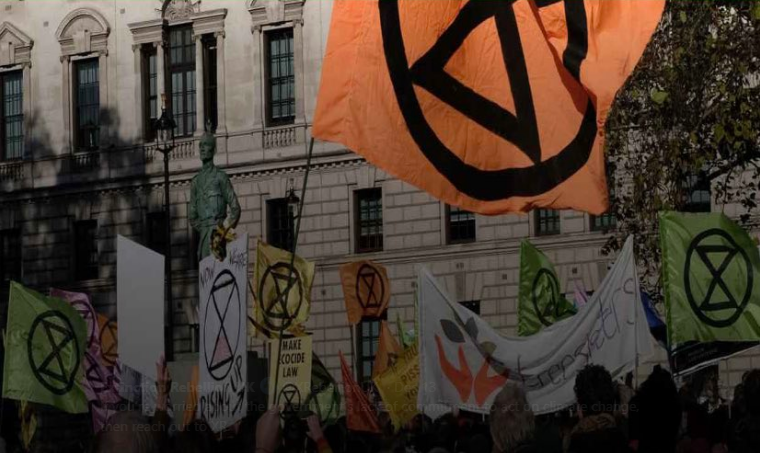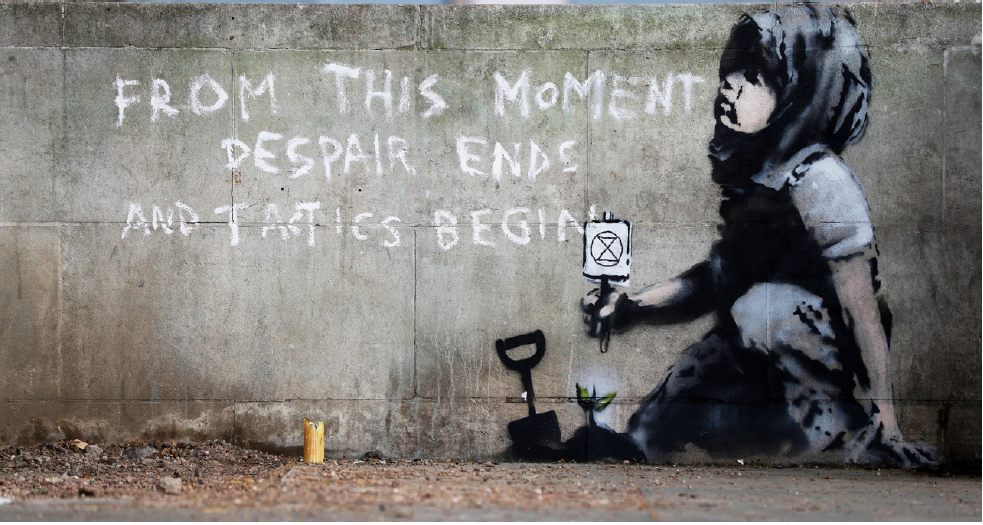Minds of the Movement
An ICNC blog on the people and power of civil resistance
by Elizabeth A. WilsonDecember 19, 2019
All signs are that the movement against climate change inaction is modeling itself, at least in part, on the kind of people power movements that have usually been aimed at overthrowing dictatorships or foreign occupiers. Varshini Prakash, a founder of the youth activist group Sunrise Movement, told journalist Ezra Klein that, early on, the movement realized it needed “people power,” which she defined as “a large vocal active base of public support.” And she went straight to the scholarly literature on nonviolent civil resistance, citing Erica Chenoweth’s much-quoted statistic “that if 3.5 percent of a population gets active on a particular issue…that movement inevitably wins. 3.5 percent of the population in America would be about 11 million people.”
While some movement scholars do not even think people power tactics can work to transform a structural problem like climate change, the movement is already adapting tactics from the people power playbook to take on this new and unprecedented challenge.

Source: Extinction Rebellion Twitter account.
Direct Action against Climate Change
After Greta Thunberg, the Swedish schoolgirl who catalyzed the global school strikes, the social force that has drawn most attention to climate change in recent months is Extinction Rebellion (XR), a London-based environmental group committed to nonviolent civil resistance. In little more than a year, XR has seen its profile rise dramatically, owing in part to its disruptive tactics and use of art and theatre. In October, The New York Times called the group “arguably…the most prominent and radical climate movement worldwide” and cited its use of “nonviolent mass disruption” as what “has catapulted the group to worldwide recognition and leadership on the issue.” Its “Autumn Uprising” saw coordinated actions taking place over 12 days in more than 60 cities across the globe, though none as large as in the UK.
Unlike a number of other new climate movement organizations, XR is not a primarily youth-centric group (though it has a youth wing). Nevertheless, it has undeniably drawn energy from the youth school strikes against climate change; its rise coincided fortuitously with the school strike movement led by Thunberg. These synergies have been potent: Thunberg has appeared at XR actions, and XR has chosen to organize its more disruptive and illegal tactics in relation to the global climate school strikes. After the first global school strikes took place on March 15h of this year, XR commenced a 10-day action a month later. School strikers coordinated with other environmental groups for a week of global actions organized around the U.N. Climate Summit on September 23. Two weeks later, XR declared its “Autumn Uprising.”
Like the Sunrise Movement, XR stresses the need to “mobiliz[e] 3.5% of the population to achieve system change.” Of all the activist groups that have emerged in the past year to protest inaction on climate change, XR is most committed to the classic Gandhian tactic of courting mass arrest, a tactic that has elicited some controversy but also had huge success in getting press coverage, raising money, and provoking government action. XR “went global” after only five months. Anyone observing the 10 values and principles—including nonviolence, inclusivity, self-reflection, among others—can act in the name of XR, though participants in direct action are asked to sign a “rebel agreement.” Seeing the success of XR, some youth climate groups are now expressing more interest in direct action.
In April, XR-UK occupied iconic London sites—Parliament Square, Marble Arch, Oxford Circus, Waterloo Bridge, Piccadilly Circus—blockading traffic while maintaining a cheerful, calm atmosphere. Protesters glued themselves to trains and the entrance of the London Stock Exchange, marched on Heathrow airport, staged “die-ins,” chained themselves to Labor leader Jeremy Corbyn’s home, and caused property damage at Shell headquarters. Over 1000 people in London were arrested in the first 8 days of the actions. Direct actions were also held in France, Australia, in front of the Wall Street bull, and in many other countries.
Background
The birth of Extinction Rebellion was heralded by a letter, signed by 94 academics, to The Guardian newspaper on October 26, 2018, declaring that the “social contract” between the government and the people had been broken: "When a government willfully abrogates its responsibility to protect its citizens from harm and to secure the future for generations to come, it has failed in its most essential duty of stewardship. The “social contract” has been broken, and it is therefore not only our right, but our moral duty to bypass the government’s inaction and flagrant dereliction of duty, and to rebel to defend life itself."
XR is largely the brainchild of founders Roger Hallam and Gail Bradbrook who were both part of the now-defunct group Rising Up, from which most of Extinction Rebellion’s mission statements are drawn.
Hallam in particular is responsible for the group’s strategy. After losing his organic farm to what he considered extreme-weather events, Hallam studied civil disobedience at King's College, London, and became convinced that traditional environmental organizing had failed and that direct action on climate change was needed. This conclusion was reinforced when he and another activist were charged with vandalism after they entered Kings College London in 2017 and spray-painted “Divest from oil and gas” on the walls in water-soluble paint. Shortly after the action, King's College divested from fossil fuels, and in 2019, after they entered a “justification” defense, a jury declared them not guilty.
Strategy and Demands
Hallam condensed the conclusions of his studies into a 78-page pamphlet, in the tradition of Thomas Paine, called Common Sense for the 21st Century: Only Nonviolent Rebellion Can Now Stop Climate Breakdown and Social Collapse.

Cover art from Hallam’s pamphlet credited as “Anonymous painting photographed during Extinction Rebellion action in Marble Arch, April 2019.” It is thought to be a Banksy work. [Note: Hallam’s book is being sold now in bookshops, with the Banksy cover—all proceeds are going to produce more copies.
Noting that “reformist” efforts had failed to curb carbon emissions, Hallam outlined the need for rebellion and a “revolutionary transformation of our societies and politics.” He proposed giving the current government an ultimatum and, if that ultimatum was not met by a certain date, initiating nonviolent mass action. The aim of this would be to force negotiations on a political transition, in which “[t]he current government hands power to an administration which will call a national climate and ecological emergency and immediately take necessary measures. The new governing body would be a National Citizen’s Assembly, composed of randomly selected individuals, that would “deal with the climate crisis.”
The homepage of Extinction Rebellion negotiates a finer line between reformism and revolution, announcing three demands that call on the UK government to act:
- Tell the truth: Government must tell the truth by declaring a climate and ecological emergency, working with other institutions to communicate the urgency for change.
- Act now: Government must act now to halt biodiversity loss and reduce greenhouse gas emissions to net zero by 2025.
- Beyond politics: Government must create and be led by the decisions of a Citizens’ Assembly on climate and ecological justice.
Extinction Rebellion working groups have also drafted a bill for Parliament to turn the three demands into law—the Climate and Ecological Emergency (Declaration, Emissions Target and Citizens’ Assembly) Bill or “Three Demand Bill” and are looking for member sponsors.
Successes and Future Challenges
The UK government has so far met two of these demands—declaring a climate emergency and beginning to convene a Climate Citizens’ Assembly—though there is controversy about both moves. The climate emergency declaration was non-binding and thus largely symbolic. The citizens’ assembly will gather a representative selection of the population and task them with making recommendations on climate change through informed and civil debate, but these recommendations will not be binding either, as XR demanded.
Taking a step back however, while earlier people power movements had some transnational reach, most notably the anti-nuclear movement, it is fair to say no movement with this scale and complexity has ever been organized before. To halt global carbon emissions, the movement itself must be globally inclusive, including developing countries. To keep the planet below the critical figure of 1.5 degrees Celsius temperature rise, change will have to affect every aspect of modern civilization—from transportation and energy, to fashion and food, to health and architecture, to trade and finance—and, not least, to the engine driving modern capitalism itself: growth.
Despite massive initial success, the progress of XR has been rocky in subsequent months. Its founder Roger Hallam in particular generates controversy. Whether XR can recover its early momentum and lead a truly global movement against climate change remains to be seen.

Elizabeth A. Wilson
Elizabeth A. Wilson is the author of People Power and International Human Rights: Creating a Legal Framework (International Center on Nonviolent Conflict, 2017). She is a human rights lawyer, currently visiting scholar at Rutgers Law School-Newark and formerly Assistant Professor of English at Yale University.
Read More